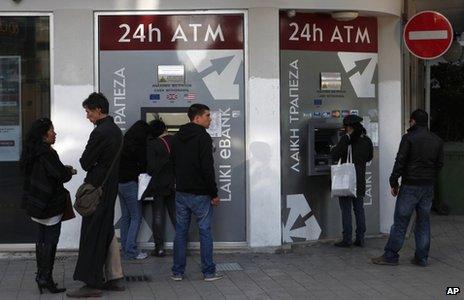Cyprus and the eurozone's survival
- Published
- comments

One reason why the Cypriot bailout debacle matters - perhaps the main reason - is that it shows how far the eurozone is from the kind of solidarity which many believe essential to the currency union's long-term survival.
A simple solution to Cyprus's financial woes was on offer to eurozone governments. That would have been a 10bn euro direct injection of equity capital into Cyprus's weak banks by the European Stability Mechanism (ESM).
This would, in effect, have turned Cyprus's two biggest banks, Bank of Cyprus and Laiki, into the property of the entire eurozone; and it would have prevented the 10bn euros becoming an unsustainable liability of the financially overstretched Cypriot state.
This solution, of the ESM bypassing the balance sheets of national governments and directly recapitalising banks, was already rejected by finance ministers when a number of Spanish banks were close to collapse last year.
What was agreed for Spain is that up to 100bn euros would be lent to the Spanish state, for the purposes of strengthening its banks - with this 100bn euros, as it is drawn down, swelling the national debt.
But if eurozone finance ministers did not want to become direct shareholders in Cypriot banks, via the ESM, why didn't they replicate what they had done for Spain and simply lend what Cyprus's banks need to the government in Nicosia?
Well, it was felt that - unlike the case of Spain - the Cypriot state could not afford all the extra debt.
Cyprus required 17bn euros of financial help in total, with 7bn euros needed to finance the government itself, plus the 10bn euros for the banks.
This 17bn euros of loans from the eurozone and International Monetary Fund would have taken Cyprus's national debt to 145% of its GDP, or economic output, which was seen by eurozone finance ministers as unsustainably high.
Also, as I have mentioned before, the German government did not want to lend to bail out the Russian money-launderers and tax avoiders who it believes are the owners of vast deposits in Cypriot banks.
All of which explains why the finance ministers insisted that 5.8bn euros of the needed 17bn euros should come from a levy on deposits in Cypriot banks.
Anyway, that is the logic of how eurozone finance ministers forced a bailout package on Cyprus that neither its politicians or people can or have accepted.
But what is odd about the behaviour of the finance ministers is that they did not apparently see how damaging their actions would be in relation to the perceived ability of the eurozone to thrive and survive.
Quite apart from creating the dangerous precedent that savers and lenders to banks will incur serious losses as and when those banks get into difficulties - which undermines efforts to rebuild confidence in the Spanish and Italian banking systems (see here) - it also shows that one of the presumed "sine qua nons" of the rehabilitation of the eurozone, a so-called banking union, is a distant dream.
There are two sides to a banking union. There is central supervision and regulation of eurozone banks, to stop them behaving in the way that those in Ireland, Spain and Cyprus did - or so recklessly that they come close to bankrupting the state.
This control and monitoring aspect of banking union is gradually being implemented, with the European Central Bank becoming the supreme supervisor of eurozone banks.
The other side of banking union is the pooling of national resources to rescue any bank, anywhere in the eurozone, that is close to collapse (or to close down the relevant bank if that seems the better option).
What the mess in Cyprus shows is that eurozone governments are a million miles from feeling comfortable about using their taxpayers' money to sort out the problems of banks outside of their home countries.
The German government, in particular, is adamant that it will not allow the ESM, the eurozone's rescue fund, to invest directly in banks in Ireland, or Spain or Cyprus, or any other part of the eurozone.
To be clear, the 10bn euros needed by Cyprus's banks is a rounding error in relation to the resources of the European Stability Mechanism or of the German state.
But it is not the quantum of money that is the issue for Angela Merkel and her government. It is the principle, that eurozone solidarity has very clear financial limits.
And what many will fear, with some justification, is that Germany has set those limits in a way that sustains a serious existential threat to the eurozone.